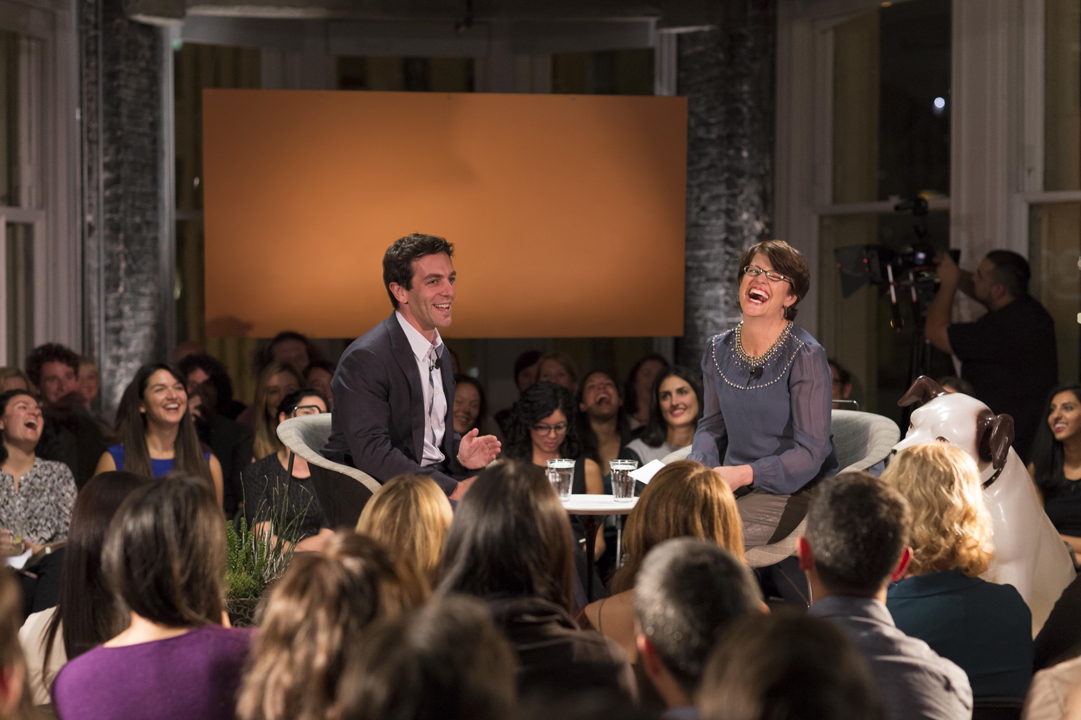Episode descriptions
BJ Novak: Why Does Dark Comedy Work?
A skeptical outlook on everything fosters an honest recalibration of how things really are versus how people think they are, says the author and actor BJ Novak, and that creates comedy. Novak digs into how dark comedy can bring people face-to-face with an ugly truth, and when is too soon after a tragedy to joke about it. Novak dishes on Hollywood, and talks about sources of creativity, but the surprise is his insight into the visceral nature of comedic truth.
Nicholas Kristof: How Do We Change the World?
The greatest human kindness amid the worst human atrocities — that’s what Nicholas Kristof says he’s witnessed in more than three decades as a reporter around the globe. Kristof could have every reason to be cynical, but he believes in the value of every act of compassion, no matter how small. Probing the nature of hope, Kristof offers a grounded, rationale view on the vast realm of human potential.
Anne Lamott: How Do We Forgive One Another?
How do we forgive the people we don’t like? Writer Anne Lamott doesn’t pretend she knows the answer to one of the toughest questions humanity faces, but, then, it turns out she kind of does. Lamott and Corrigan trade stories about compassion, empathy, growing older and doing love. Through it all, they spill the honesty, hilarity and transparent self-awareness that have made both women bestselling authors.
Mary Roach: Is It Always Good to Know More?
Does it deaden your sex life to participate in a sex study? That’s just one of the questions Corrigan tosses out to bestselling author Mary Roach in a quest to find out whether it’s really better to know more about everything. Roach and Corrigan roam through many of the topics that make us uncomfortable, from sex and death to meeting the “other” with an open heart. Along the way, they discover just a few of the ways human life can have meaning.
Jason Segel: What’s the Secret to Being Great?
Optimistic, pragmatic and multitalented, actor and screenwriter Jason Segel is convinced that we can all experience moments of magic, when possibilities from the future nudge our hearts. Segel and Corrigan talk about choosing to stick with something you aren’t very good at it. For anyone who imagines taking flight, Segel is air under your wings.
Walter Isaacson: How Does Innovation Happen?
Innovation is not a solo act, says Walter Isaacson. The founder of the Aspen Institute and biographer of Steve Jobs and Albert Einstein confesses that even many biographers participate in the mythology of the lone inventor, struck by a bolt of lightning. But that’s not how it really is, he tells Corrigan, as their conversation ranges over everything from how Ada Lovelace prefigured the personal computer to how to cultivate our imagination.
John Cleese: What Is Creativity?
Creativity requires a space where nothing much is happening, says John Cleese. The iconic British comedian offers his recipe for getting out of ruts, defines humor and serves up some ingeniously bad behavior, leaving listeners both dumbfounded and delighted.
Matt Nathanson: Where Does Optimism Come From?
If you thought you were the only person with a demonic inner critic, Matt Nathanson is here to assure you that, not only do we all face down the naysayer, but also there may even be a role for pessimism. Corrigan and Nathanson exchange stories about what keeps them chipping away at making art, and offer up a survival manual for arguing with a spouse. Hint: It involves a five year old.
Margaret Atwood: What Does the Future Hold?
Funny and insightful, Margaret Atwood muses on visions of learning, work and women’s lives a century from now, and tells tales of growing up in the wilderness of Canada where there was, literally, she says, nothing there. Atwood and Corrigan trade stories on what no one tells new mothers, and try to figure out what bioengineering means for humanity. From beginning to end, Atwood’s directness and humanity leave you with a sense of peering into a future both dark and hopeful.
About Kelly Corrigan
Kelly Corrigan is the author of Glitter and Glue, The Middle Place and Lift, bestselling memoirs about family life that have earned her comparisons to Erma Bombeck and Nora Ephron. The Huffington Post called her “the poet laureate of the ordinary.” The comment she most often hears from readers about her takes on everything from ambition to crisis to the value of a simple apology is “Exactly.”
Support
Interviews for Exactly are made possible by Medium. Funding is provided by the John Templeton Foundation.
 San Francisco, CA — The gap between being inspired and entertained just got smaller. Take the brainy topics of a TED Talk, the informative wit of The Daily Show and the insightful questioning of Terry Gross, sprinkle in a rapt studio audience, and you have Exactly, a new podcast series from KQED. Hosted by three-time New York Times bestselling author Kelly Corrigan, Exactly features interviews with some of the most creative writers and entertainers of our time. Corrigan and her guests roam with insight and humor toward that inevitable moment when you think, “Exactly!”
San Francisco, CA — The gap between being inspired and entertained just got smaller. Take the brainy topics of a TED Talk, the informative wit of The Daily Show and the insightful questioning of Terry Gross, sprinkle in a rapt studio audience, and you have Exactly, a new podcast series from KQED. Hosted by three-time New York Times bestselling author Kelly Corrigan, Exactly features interviews with some of the most creative writers and entertainers of our time. Corrigan and her guests roam with insight and humor toward that inevitable moment when you think, “Exactly!”